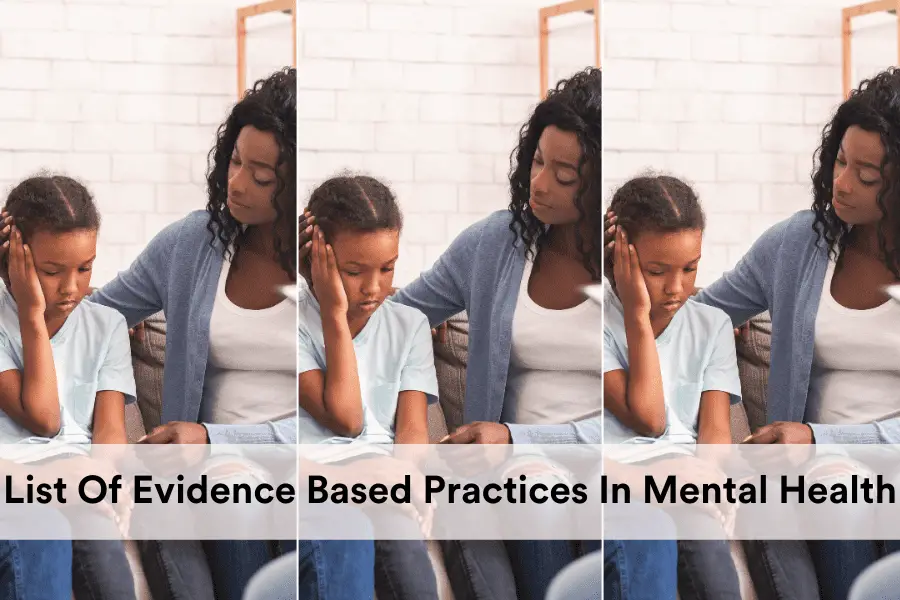In today’s world, mental health has become a crucial area of focus—but how do we ensure we’re getting the best possible care? In this post, we’ll talk about the ultimate list of evidence-based practices in mental health and how to choose the right approach for you.

As a black woman exploring therapy options, I’ve come to realize the importance of understanding the different types of therapy practices available. My goal in working closely with our staff’s Experience Curator, and BWG blog founder Candace, is to dig deeper into these options and share our findings with you. Armed with this knowledge, you can feel more confident in finding a therapy that perfectly suits your needs and preferences.
This post is all about knowing the list of evidence-based practices in mental health so you can make informed therapy choices.
Table of Contents
Understanding THE Evidence-Based Practices in Mental Health

Evidence-based practices in mental health refer to the use of scientifically supported treatments, approaches, and interventions backed by extensive research.
These practices have been proven to be effective in addressing various mental health concerns, ensuring that you receive the best possible care. Let’s explore the top evidence-based practices in mental health and their significance for both healthcare professionals and patients alike.
Top 8 Evidence-Based Practices in Mental Health
1. Cognitive Behavioral Therapy (CBT): CBT is a widely recognized and well-researched short-term therapy approach that addresses negative thought patterns and helps replace them with healthier, more adaptive ones. This type of therapy has been effective in treating various mental health conditions, including anxiety, depression, and post-traumatic stress disorder (PTSD).
2. Dialectical Behavior Therapy (DBT): DBT, a specialized form of CBT, focuses on developing skills to manage emotions, improve relationships, and tolerate distress. This therapy has been particularly beneficial for borderline personality disorder (BPD) and other severe mental health conditions.
3. Motivational Interviewing (MI): MI is a counseling technique aimed at empowering clients to make positive behavior changes by exploring their values, motivation, and willingness to change. This method has been particularly effective in addressing addictive behaviors and mental health concerns associated with substance use.
4. Trauma-Informed Care: Trauma-informed care is an approach that recognizes the impact of past trauma on mental health and actively integrates this understanding in treatment planning. This approach ensures a safe and supportive environment and is essential for individuals with a history of trauma or abuse.
5. Exposure Therapy: This therapeutic technique has proven highly effective in treating anxiety disorders and phobias. Exposure therapy involves gradually confronting clients with the source of their fear to systematically desensitize them and reduce the intensity of their anxiety.
6. Psychodynamic Therapy: Drawing from Freudian psychoanalytic theory, psychodynamic therapy delves into unconscious processes, past experiences, and unresolved conflicts to understand and address current mental health concerns. This approach has been invaluable for individuals with long-standing emotional difficulties.
7. Family Therapy: Family therapy focuses on addressing mental health issues as they relate to family dynamics and interpersonal relationships. This therapy aims to improve communication, understanding, and functioning within the family unit for the overall mental health of all members.
8. Interpersonal Therapy (IPT): IPT is a time-limited therapy that focuses on current interpersonal relationships and their impact on mental health. This approach has proven to be effective in treating mood disorders, eating disorders, and other mental health concerns with a strong social component.
Related Post: The Black Therapist Directory: 6 Game-Changers in Addressing Mental Health Disparities
Answering Key Questions
What is an example of evidence-based practice in mental health?
Cognitive Behavioral Therapy (CBT) is a prominent example of evidence-based practice, as it is backed by extensive research and has demonstrated efficacy in treating a broad range of mental health conditions.
What is evidence-informed practice in mental health?
Evidence-informed practice is the integration of research evidence, clinical expertise, and the patient’s values and preferences to guide mental health treatments. This approach ensures that therapists and other mental health professionals use the most effective methods based on scientific evidence and the unique circumstances and preferences of each client.
What are the evidence-based interventions for severe mental illness?
For severe mental illness, interventions like dialectical behavior therapy (DBT) and assertive community treatment (ACT) have proven highly effective. Another option is coordinated specialty care (CSC), a more comprehensive approach that combines psychotherapy, medication management, supported education and employment, and case management.
Embracing Evidence-Based Practices in Mental Health

In conclusion, it’s essential for both healthcare professionals and patients to prioritize and explore evidence-based practices in mental health. By utilizing these scientifically supported treatment methods and approaches, you can ensure that you are receiving the best possible care for your mental health journey.
Interested in a transformative program created specifically for Black women?
Consider investing in our 7-day audio course, “Bloom: A 7-Day Journey to Personal Empowerment,” for just $7 – a mere $1 a day for the next week to jumpstart or refresh your growth in all aspects of your life.

Choosing the Right Therapy for You as a Black Woman

As Candace, our Experience Curator, previously mentioned, there is a great need for more discussion around the different types of therapy practices available. As Black women, we may face unique challenges and experiences, making it even more important to find a therapy approach that caters to our specific needs. In this section, we will discuss some tips for selecting the right therapy for you, keeping in mind the importance of evidence-based practices.
Learn about the Different Types of Therapy
The first step in finding the right therapy for you is gaining a clear understanding of the various therapy options available. The ultimate list of evidence-based practices in mental health mentioned earlier in this post is a valuable starting point for your research.
Consider Your Personal Needs
Everyone’s mental health journey is unique, and understanding your individual needs is essential. Reflect on the specific issues or concerns you would like to address in therapy, and consider whether those align with the evidence-based practices discussed earlier. For example, if you struggle with anxiety, Cognitive Behavioral Therapy (CBT) or Exposure Therapy may be a suitable fit.
Speak with Potential Therapists
Once you have narrowed down your therapy options, reach out to potential therapists to discuss the evidence-based practices they use in their work. It is important to feel comfortable with your therapist, so take the time to gauge whether you communicate well with them and establish trust.
Evaluate the Therapy’s Cultural Competence
As Black women, we must pay attention to the cultural competence of the mental health professionals we choose. Look for a therapist who understands the unique experiences and challenges faced by black women and who can tailor their approach to be culturally sensitive and inclusive. By following these tips, you can confidently select a therapy approach grounded in evidence-based practices that cater to your specific needs as a black woman.
How BlackWomanGreat.com Supports Your Journey

At BlackWomanGreat.com, we understand the importance of personal growth and empowerment for black women across the globe. Our 7-day audio course, “Bloom: A 7-Day Journey to Personal Empowerment,” is designed specifically to support your journey of growth and self-discovery. For just $7 – the equivalent of $1 a day – immerse yourself in this transformative program that addresses all aspects of life, including mental health.
Overcoming Stigma and Embracing Mental Health Resources as a Black Woman
As black women, we may face unique barriers when it comes to addressing our mental health, including stigma within our communities. It is vital to challenge these stigmas and work towards greater understanding and acceptance of mental health issues. Let’s discuss some ways you can do this in your own life.
Openly Share Your Experiences

The more we talk about mental health, the more we normalize and validate these conversations. Be open with loved ones about your experiences and struggles. Share your journey to finding an appropriate, culturally sensitive therapist and discuss the benefits of utilizing evidence-based practices.
Educate Your Community
Educate those around you about mental health conditions and the importance of evidence-based practices. There may be misconceptions or a lack of understanding about mental health, so take the opportunity to dispel myths and provide accurate information.
Connect with Supportive Communities Online
There are many online communities where like-minded Black women can come together to discuss shared experiences and empower each other. Join support groups, social media pages, and online mental health communities, like blackwomangreat.com, to find reassurance, understanding, and advice.
Use Available Resources
Embrace Your Mental Health Journey with Blackwomangreat.com

At Blackwomangreat.com, we’re passionate about supporting Black women in their journey to self-improvement and happiness. Our “Bloom: A 7-Day Journey to Personal Empowerment” audio course is designed for those ready to embrace their self-growth across all aspects of life. For just $7, invest in your personal development and experience the transformative power of Bloom, created exclusively for Black women like you. Join us in dismantling stigma and embracing evidence-based mental health practices in our community.

This post was all about the list of evidence-based practices in mental health.
